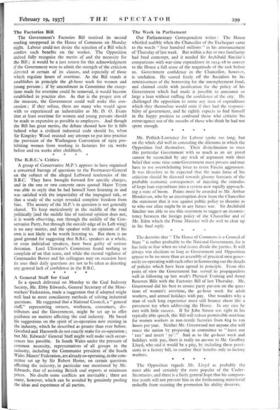The Factories Bill The Government's Factories Bill received its second
reading unopposed in the House of Commons on Monday night. Labour could not desire the rejection of a Bill which confers such benefits on the worker. The Opposition indeed fully recognise the merits of and the necessity for the Bill ; it would be a just return for this acknowledgment if the Government were to admit the strength of the criticism directed at certain of its clauses, and especially of those which regulate hours of overtime. As the Bill stands it establishes in principle the 48-hour week for women and young persons ; if by amendment in Committee the excep- tions made for overtime could be removed, it would become established in practice also. As that is the proper aim of the measure, the Government could well make this con- cession ; if they refuse, there are many who would agree with so experienced an industrialist as Mr. D. 0. Evans that at least overtime for women and young persons should be made as expensive as possible to employers. And though the Bill has great merits, the debate showed how far it falls behind what a civilised industrial code should be, when Sir Kingsley Wood resisted any attempt to put into practice the provision of the Washington Convention of 1919 pro- hibiting women from working in factories for six weeks before and six weeks after childbirth.














































 Previous page
Previous page